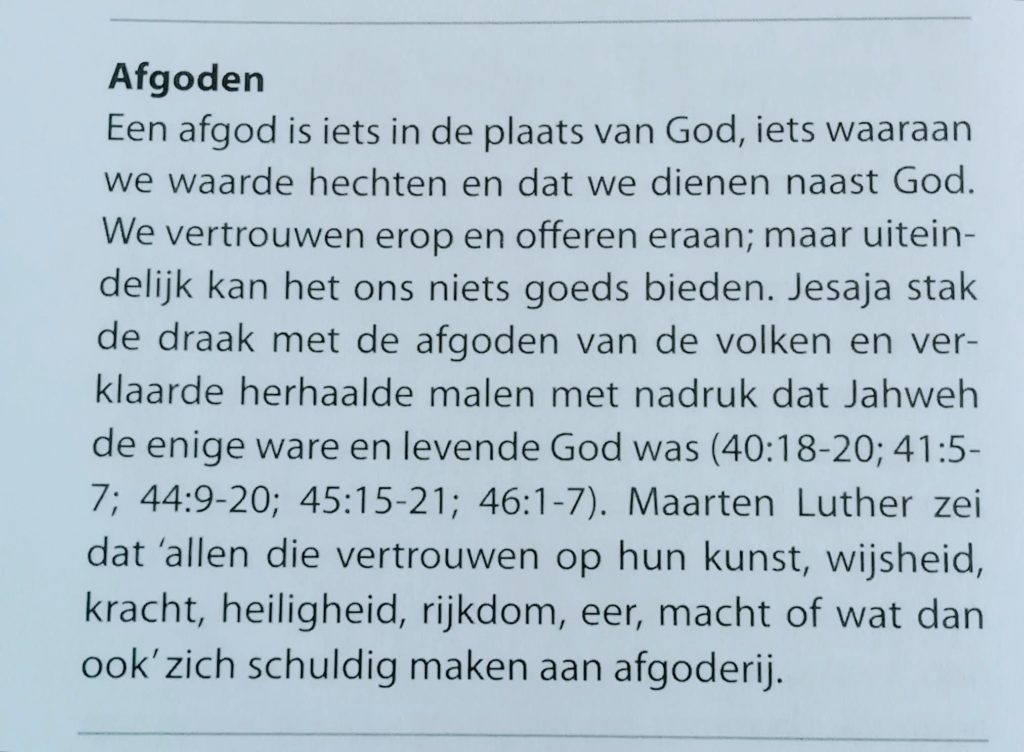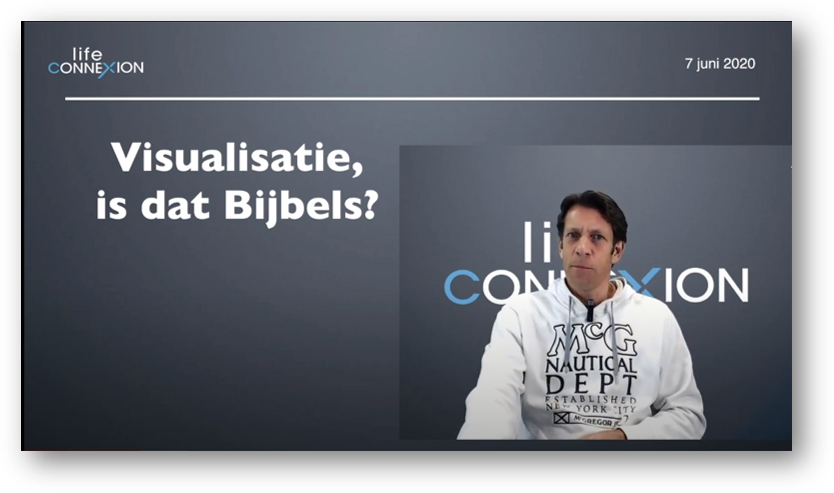In gesprekken over wat afgoderij volgens de bijbel wel of niet is, krijg ik af en toe te horen dat de Bijbel toch zegt dat ‘hebzucht afgoderij is?’. Men gaat er dan vanuit dat afgoderij (min of meer) synoniem is met ‘dingen belangrijker vinden dan God’. Onlangs kreeg ik deze vraag nog een keer per mail van een broeder en in diezelfde periode (toevallig?) las ik wat enkele christenen over afgoderij gezegd of geschreven hebben[1].

Deze interpretatie (of toepassing) van afgoderij komt heel veel voor, en van mij mag het. Maar ik blijf wel vasthouden aan mijn interpretatie van afgoderij waarbij altijd sprake is van lichamelijke ‘godservaringen’. Twee verschillende opvattingen en derhalve een goede aanleiding om op zoektocht te gaan naar de betekenis van ‘greed, which is idolatry‘. Daarbij lopen we door de volgende vragen:
- What is greed and what is said about it in the NT
- Which means 'greed, which is idolatry' (Colossians 5:3) of ‘covetous man, who is an idolater' (Ephesians 5:5)
- What is the most likely explanation of these expressions
- What is the concrete application in practice?
what is greed
There is no precise definition of greed. It is roughly understood as “an insatiable desire for more accompanied by dissatisfaction because it is never enough”.
- A constant desire for more that does not cease (see Ecclesiastes 5:9; "He who loves money is never satisfied with money")
- Discontent comes from greed (contentment comes from godliness; 1 Timothy 6:6)
- The desire for riches opens the way to other evils and to losing faith; it is a road to destruction and ruin (1 Timothy 6:9;10)
- Greed is one of the things that come from the sinful heart (Mark 7:21-23; Romans 1:29)
If you read the texts that (for example in the New Testament[2]) over ‘hebzucht’ gaan dan komt daaruit naar voren dat het vooral – maar niet uitsluitend – gaat om geld en goederen, dus om materiele dingen. Daar gaat het verlangen naar uit.
Hopefully this gets us to the core of 'greed' and we need to ask ourselves what's going on with 'greed, which is idolatry'.
What can it mean?
There are two texts in the New Testament where greed is linked to idolatry.
- “ 3 But fornication and all uncleanness or greedby no means let them be named among you, as befits saints, 4 nor indecency, foolish talk, and frivolous speech, which are indecent; but much more is thanksgiving. 5 For this you know, that no fornicator, unclean, or covetous man, who is an idolater, has an inheritance in the kingdom of Christ and of God. 6 Let no one deceive you with empty words, for because of these things the wrath of God comes upon the children of disobedience.” (Ephesians 5:3-6)
- “ 5 Then kill your members which are on the earth: fornication, uncleanness, passion, evil desire, and the greed, which is idolatry. 6 By these things the wrath of God comes upon the disobedient.” (Colossians 3:5,6)
The question is how do we'greed, that idolatry is’[3] have to read. What could it mean and what does it certainly not mean? We're going to sort some things out.
Om te beginnen moeten we vaststellen dat afgoderij en hebzucht niet hetzelfde zijn. Ze zijn niet identiek en je kunt er geen = teken tussen zetten. De reden daarvoor is dat op andere plaatsen hebzucht en afgoderij in de Bijbel als twee afzonderlijke ‘kwaden’ naast elkaar worden genoemd. Zo bijvoorbeeld in 1 Korinthe 5: 10 en 11 en 1 Korinthe 6:10. Dat geeft aan dat hebzucht en afgoderij niet hetzelfde zijn.
That is why there is apparently greed that you not as idolatry and there is greed that you can at least say is somehow connected with idolatry.

If we cannot say 'greed = idolatry', then the reverse is also not true. The two concepts are not identical and so you should not turn it around and say that idolatry equals greed or that idols are all things that can take the place of God in your heart and life.
Now the question remains how you'greed, which is idolatry’ dan wel moet opvatten? Wanneer we zeggen ‘geweld, dat terroristisch is’ dan betekent het dat dit geweld een uiting is van terreur of geweld dat hoort bij terreur. Dit in tegenstelling tot geweld dat zelfverdediging is of geweld dat politioneel is. De uitdrukking ‘die afgoderij is’ is mijns inziens dan ook een soort-aanduiding bij hebzucht.
I suspect the best and simplest reading of the text is 'greed, which [is] associated with idolatry of ‘greed [accompanied] by idolatry’. Maar misschien is het nog simpeler wanneer we lezen ‘hebzucht , die [ook] afgoderij is’. In that case, we really only notice that there is greed that has to do with idolatry in one way or another.
But the question that then arises is of course what that means: what can idolatry have to do with greed? Because without the answer to that, we really don't know anything yet.
To answer this question we have to go back to man's relationship with the invisible world ("the gods").
- We have elsewhere (see for example here) has already described something about the human need to receive confirmation from the invisible world. People need to be 'confirmed and blessed' by the deity. One of the things that people can ask of the gods (or the deity) is material blessing and prosperity. People seek contact with the deity with the aim of prospering financially. The lust for wealth and possessions drives them to expect this from the invisible world. I think we should understand the expression "greed, which is idolatry" in this sense.
- The image is that man draws near to the deity ('serves him') so that the deity will satisfy the greed of man. Or put very simply, man serves the god of money so that he will make him rich and prosperous.
In the Old Testament
In the Old Testament, as far as I can see now, there are few concrete references to 'greed, which is idolatry'. There is, however, a special text in Isaiah 65:11 that reads:But you who forsake the LORD, you who forget My holy mountain, you who prepare the table for the god Gad, you who fill the cups with mixed drink for the god Meni…)”. This is the HSV translation and the Naarden Bible has: “die voor Goed Geluk een tafel aanricht die voor het Lieve Lot de plengbeker volgiet” (also see here ). Many Bible expositors assume that Gad is the name of an (Aramaic) deity and 'fortune' means. Meni would then be the name of a deity whose name is 'lot’ of ‘bestemming' means.
The context of Isaiah 65 makes it clear that it concerns the idolatry of the people of Israel. And in the 11th verse specifically mentions communion with the gods Gad and Meni, the gods of fortune and destiny. What you want (fortune) or what you want to be (your destiny) are things that kept many people busy then and for which they enlisted the help of the gods in the invisible world.
What you think becomes reality
We have already discovered what it means that 'people draw near to their gods’ en wat dat concreet inhoudt. Men gebruikt allerlei technieken om in een hogere bewustzijnstoestand te komen. Daarin neemt men de werkelijkheid anders waar en worden nieuwe opvattingen in het gevoel ingeprent. Veel gebruikt zijn meditatietechnieken (meditatie, mindfullness, hypnose, etc.) om in deze toestand te geraken.
Now when we go further and examine how people want to 'get rich', it turns out that this goes beyond what we have discovered to date and we come across the concept of 'visualization'. This is a central concept, about which a lot can be found on the internet. I'll try to get the gist of it and put it in my own words.
Visualizing is more and different than imagining and fantasizing things. Everyone does this to a greater or lesser extent. But visualization goes much further. You imagine a certain desired situation in your thinking (your head) in such a way that it becomes reality. The idea behind it is that 'thoughts are materialized'. In short, it is called 'what you think you become' and 'what you think you get'.
The idea with many is that what you visualize is communicated to the universe and that the universe gives you what you so intensely desire. This is also known as 'the law of attraction' (Law of Attraction, LoA); what I visualize I attract to me.
Incidentally, it is not the case that you only have to do this visualization once. If you want to be successful, you will have to work with it on a daily basis. I get the impression that it takes 'hard work' to 'achieve your goals'.

Founding Promise has 2 pages with an article about visualization in which, for example, the following is written. I have a few keywords in it blue colored.
“Visualization includes deliberate manipulation of the brain, individually or in conjunction with a helper, to to change consciousness, to a specific goal, meestal de zoektocht naar een of andere vorm van geheime kennis of kracht. Misschien is de meest gezaghebbende mening over dit onderwerp te vinden in “Seeing with the minds eye, the history, techniques en practices of visualisation“, waarin staat: “Als er twee belangrijke ‘nieuwe’ concepten in de 20/21ste eeuw in het westen te vinden zijn is het wel meditation and visualization.” Verder lezen we in dit boek: ‘De stijgende interesse in visualisatie sinds 1960 is een deel van het nieuwe klimaat in de westerse wereld. Dit komt tot uitdrukking in een toenemende interesse in allerlei vormen van verbeelding, in het herleven van oosterse godsdiensten en filosofieën, in hypnose en het gebruik van hallucinerende drugs, eigenlijk in een altered state of consciousness.” (Source: Promise Foundation)
“Until recently, the use of visualization techniques belonged only to the field of occultists and shamans. Nu echter gebruiken artsen, atleten, onderwijzers, artiesten, zakenlieden en zelfs geestelijke ambtsdragers allerlei vormen van ‘moderne’ visualisatie. Jammer genoeg hebben veel artsen, psychologen en anderen nauwelijks verstand van de werking van spirituele misleiding. Ze zijn zonder het te weten pionnen geworden in een strijd waarvan de spelers voor hen onzichtbaar zijn.” (Source: Promise Foundation)
Elsewhere there is another interesting thing to read.
“One of the best-known self-help books is Think and Grow Rich by Napoleon Hill. This 1937 classic is one of the first books to proclaim the nothing less than revolutionary idea that people can get what they want if they really believe it. In zijn boek claimt Hill dat jij arm bent omdat je nooit zoals de miljonair hebt leren denken. Denken en voelen dat je rijk bent, maakt jou rijk. (…) Misschien ken jij dit idee van dat andere populaire zelfhulpboek: The Secret van Rhonda Byrne.
The adopted explanation for the successes of visualization goes way beyond the self-fulfilling prophecy (which explains that when you think positively and have faith in a good outcome, you consciously and unconsciously set everything in motion to make it so). Because trusting only your own mind is somewhat limited, many self-help gurus propose a grander and more spiritual mechanism: the mercy of the universe yourself. The universe, they say, will give you everything you want if you know how to ask for it. Literal. Hill called it 'infinite intelligence', Byrne 'the Law of Attraction'. According to Byrne, many historical figures knew 'the secret' before she wrote her book. Jesus, Plato, Galileo, Newton, Beethoven, Edison, and Einstein, she said, were some of the geniuses who used it.
The central idea is that thoughts not only shape our behavior, but actually send a message out into the universe that the universe then understands and responds to.”

As an illustration below a few more quotes.
"To a what a leap te maken richting de realisatie van your goals in life there is a wonderful tool that can help you immensely. It is the power of visualization. Especially for realizing wat je wilt hebben en wat je wilt doen (…) visualization is an absolute winner.” (Source: here)
“One of the people who has elevated visualization to a true art form is the American writer Shakti Gawain. She says: 'Creative visualization is the technique of using your imagination to to actually accomplish what you want. Er is helemaal niets nieuws, vreemds, of ongewoons aan creatief visualiseren. Je maakt er al elke dag, elke minuut gebruik van. Het is je natuurlijke verbeeldingskracht, die je voortdurend gebruikt.” Op dezelfde website/pagina: “ Napoleon Hill zegt het zo: ‘Door creatieve fantasie heeft de eindige geest van de mens rechtstreeks contact met de Oneindige Intelligentie. Met dat vermogen kunnen we ingevingen of inspiraties ontvangen. Alle fundamentele of nieuwe ideeën vinden hun weg naar de mens via creatieve fantasie.” (Source: here)
Of course you will also find the view on the internet that this whole story of visualization cannot be true. But that does not alter the fact that entire tribes do believe in it and practice it. The belief that “what you visualize also becomes reality in physical reality” beats his thousands, making no secret of the fact that 'the universe' or 'infinite intelligence' makes a significant contribution.
In Christendom
These kinds of practices bring people under the influence of demons (the invisible world). That should be enough for a Christian to say 'no' to this. But unfortunately you find the same things increasingly among Christians.
Het idee dat ons denken de werkelijkheid bepaalt, is ook de christelijk wereld binnengeslopen. Het gaat me te ver om allerlei zaken van het ‘welvaartsevangelie’ en de ‘Word of Faith’ beweging te analyseren en beschrijven. In elk geval is het nauw gelieerd aan de charismatische beweging, komt in veel mega-kerken in de VS en elders voor. Ook in Nederland zijn er voorbeelden te vinden, waarvan we hieronder een paar zullen noemen.
Jos Hobé writes about the 'prosperity gospel' (prosperity gospel). its site among other:
Positieve beeldvorming of visualiseren is een oude techniek die voorkomt bij sjamanen en andere occultisten. Ook de bekende occulte psychiater Carl Jung maakte gebruik van deze techniek. Norman V. Peale noemde visualiseren een verdere ontwikkeling van positief denken. Door in gedachte dingen te visualiseren zal dit in het natuurlijke gebeuren.
Kenneth Copeland zegt het volgende hierover: ‘Als u kreupel bent en niet normaal kunt lopen, dan moet u op een stille plek gaan zitten. Ga in gedachten en zie uzelf helemaal genezen. U kunt lopen en uw benen zijn volledig gezond. Dit beeld zal in het Heilige der Heilige gevormd worden en in het natuurlijke zal het werkelijkheid worden.” (The Laws of Prosperity K. Copeland Publications, december 1995).
Deze vorm van visualisatie is een techniek die voorkomt in de New Age. Ook de contemplatieve beweging maakt gebruik van dit soort technieken en de cursus luisterend bidden van Leanne Payne komt voort uit deze leer.
The 'prosperity gospel' is, as far as I can see, closely linked to the 'Word of Faith' teaching. A biblical critique of the prosperity gospel states here for example the following.
“A favored term within the Word of Faith movement is 'positive confession'. This refers to the teaching that words themselves have creative power. According to Word of Faith teachers, what you say determines what happens to you in all cases.”
Does it also occur in the Netherlands?
It seems impossible to me to find out where these views occur in the Netherlands. But a short search at least yielded a few clear examples.
Bee LifeConnexion in Amersfoort they already learned that meditation is really something for Christians, but now they go a step further and teach that visualization is biblical.

I will not discuss it further here. What you will be told is top notch inlay science, which is even blasphemous at times. If you want to investigate it yourself, here's the link.
De volgende video – over de ‘wet van aantrekking – bespreek ik ook niet; alleen de titel is al genoeg lijkt me. Een van de video’s van Robert van Mierlo luidt : “Gods liefde is groter dan jouw probleem – De law of attraction explained” (for the video see here).
Tom de Wal of Frontrunners talks about the 'prosperity gospel'. God promises abundant prosperity to Abraham and therefore also to us, is his view. According to him, everywhere in the Bible you can read that God gives prosperity to those who obey Him.
We may fear that this is just the tip of the iceberg and that more and more Christian congregations will embrace this prosperity gospel with accompanying pagan practices.
Brief summary
What is the meaning of the expression 'greed, that idolatry is'. That was the initial question. We have argued that this is really just what it says and you could understand it as "greed, which is related to idolatry." This is in contrast to 'ordinary' greed, which cannot be said to have to do with idolatry.
We then saw that it practically means a desire for wealth, asking the invisible world to provide it. The latter is clearly the aspect of idolatry. Moreover, we can observe that this is indeed something that is being practiced more and more in the world.
Daarnaast de droevige constatering dat zelfs in de christenheid dit fenomeen ook steeds meer praktijk wordt. Christenen die menen dat God hen een goed en rijk (‘succesvol’) leven wil geven. Dat Hij dat ook doet als ze Hem maar serieus (dat is op een bepaalde manier, met bepaalde ‘technieken’) daarom blijven vragen. Je moet het dus wel ‘echt geloven’. Zonder dat ze in de gaten hebben dat ze daardoor onder invloed van demonen komen.
The clear lesson for a believer who wants to follow the Lord Jesus is: stay away from these kinds of beliefs and practices, for the Bible clearly states that it is disobedience to God and His wrath will come upon you. (Colossians 3:5,6).
Latest comments
Iemand zou de opmerking kunnen maken dat dit allemaal wel erg ver gezocht is. Hoe kan een mens zijn brein (bewustzijn) zo manipuleren dat de onzichtbare wereld (de demonen) als het ware in beweging gezet wordt om de wens van die mens in te vullen? Hoe kan het zijn dat demonen de fysieke wereld beïnvloeden?
Het is een terechte vraag, waarvan het antwoord misschien niet zo makkelijk is. Immers, hóe de demonen dat doen, is mij niet zo erg duidelijk. Maar dát ze het kunnen staat wel vast. Denk maar eens aan het aanbod dat de satan zelf aan de Heer Jezus deed: alle koninkrijken van de wereld, met hun heerlijkheid kon hij Hem geven, als de Heer Jezus voor satan zou knielen en hem zou aanbidden (Mattheus 4:8,9). Extremer bestaat denk ik niet en het laat zien hoe geweldig machtig de satan is. Hij heeft zoveel invloed (macht) dat hij in staat is alle wereldleiders onder Christus heerschappij te brengen. De Heer Jezus noemt hem meerdere keren “the ruler of this world.” (John 12:31;14:30;Telos 16:11) How does he do that? No idea, but he can do it! That's how powerful Satan is.
Fortunately, the Lord Jesus was able to resist this temptation. But how bizarre is it then that soon Satan will give "his strength, his throne and his might" to that other human being who says of himself that he is god (Revelation 13:2ff; 2 Thessalonians 2:4). That is Satan's man, the antichrist, possessed of satanic power, who thinks he is god. What a stark contrast to the Man of God, who rejected Satan's power because "His kingdom was not of this world" (John 18:36).
What a grace that God the Father”has delivered us from the power of darkness and transferred us into the kingdom of the Son of His love” (Colossians 1:12,13).
We may already enjoy the blessings of that kingdom here and now and will soon – and before long – see God establish another kingdom here on earth.”that will crush and destroy all those other kingdoms, but will itself stand forever” (Daniel 2:44).
Want u kent de genade van onze Here Jezus Christus, dat Hij omwille van u arm is geworden, terwijl Hij rijk was, opdat u door Zijn armoede rijk zou worden”
2 Corinthians 8:9
[1] Quote from W.Wiersbe – “Chapter by chapter through the Bible” page 264. Incidentally, you find this view in most Bible commentaries.
[2] Mark 7:21-23 21; Luke 12:13-15 15; Romans 1:28-29; 1 Corinthians 5:10,11; 1 Corinthians 6:10; 2 Corinthians 9:5 (stinginess); Ephesians 4:19 (desire); Ephesians 5:3-6; Col.3:5.6; 1 Thessalonians 2:5; 2 Peter 2:3,14
[3] We'll just take this expression as a handle and assume that we have covered the expression in Eph.5:5.

